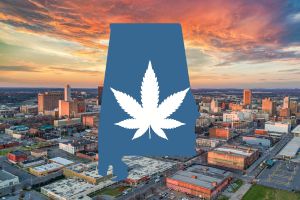Is Hemp Legal in Alabama?
Posted by Tweedle Farms on Nov 21st 2021

Navigating the Green Wave: Understanding Hemp Legality in Alabama
In recent years, the cannabis industry has experienced a transformative wave across the United States, with states adopting varied stances on its cultivation, sale, and use. Alabama, traditionally known for its conservative approach to cannabis, has begun to embrace the economic and therapeutic potential of hemp, a non-psychoactive cousin of marijuana. This article delves into the legal landscape of hemp in Alabama, addressing critical concerns for industry stakeholders and consumers alike. We will explore the nuances of hemp flower, CBD flower, and THCA flower within the state's legal framework, providing clarity and insight into this burgeoning industry.
Hemp in Alabama: A Legal Overview
Hemp, defined as the Cannabis sativa plant with a delta-9 tetrahydrocannabinol (THC) concentration of not more than 0.3 percent on a dry weight basis, has been federally legal since the passing of the 2018 Farm Bill. Alabama's alignment with this legislation through the Alabama Industrial Hemp Research and Pilot Program has opened avenues for the cultivation, processing, and sale of hemp-derived products. However, navigating these legal waters requires a thorough understanding of state-specific regulations and compliance standards.
The Regulatory Framework for Hemp Cultivation and Sale
Alabama's Department of Agriculture and Industries oversees the licensing and regulation of hemp cultivation. Stakeholders interested in entering the hemp industry must navigate a stringent application process, ensuring adherence to state and federal guidelines. This includes background checks, detailed farming plans, and compliance with testing requirements to verify THC levels. For industry participants, staying abreast of these regulations is paramount to maintain licensure and operate within legal boundaries.
Hemp Flower, CBD Flower, and THCA Flower: Legal Distinctions
The legal status of hemp-derived products hinges on their THC content. Hemp flower, often used for its CBD (cannabidiol) content, is legal provided it contains less than 0.3% THC. CBD flower, specifically bred for high CBD content and minimal THC, falls under the same legal category. However, the distinction becomes blurred with THCA flower.
THCA (tetrahydrocannabinolic acid) is a non-psychoactive precursor to THC found in raw and unprocessed hemp. While THCA itself is not psychoactive, its potential conversion to THC upon decarboxylation (the process of heating the plant material) raises legal and regulatory questions. Alabama law remains ambiguous regarding THCA, necessitating cautious interpretation by both industry stakeholders and consumers.
Legal Challenges and Consumer Concerns
Despite the legal framework for hemp cultivation and sale, challenges persist. Law enforcement officials sometimes struggle to differentiate between legal hemp products and illegal marijuana, leading to legal disputes and confusion. This underscores the importance of clear labeling, third-party testing, and transparency in the hemp industry.
Consumers, on the other hand, express concerns about product quality, safety, and efficacy. The lack of FDA regulation for hemp-derived CBD products (like CBD gummies, pre rolls, and even CBD topicals) amplifies these concerns, driving demand for standardized testing and certification processes. Industry stakeholders must address these consumer concerns to build trust and ensure the long-term viability of the hemp market in Alabama.
Future Prospects and Legislative Evolution
The hemp industry in Alabama, while nascent, holds significant economic and therapeutic potential. Legislative evolution is anticipated as stakeholders advocate for clearer guidelines, particularly regarding THCA and the broader spectrum of hemp-derived products. The call for research into hemp's agricultural, industrial, and medicinal applications is growing louder, signaling a potential shift towards more progressive cannabis policies in the state.
Conclusion
The legal landscape of hemp in Alabama is complex, shaped by evolving legislation and the balancing act between economic opportunity and regulatory oversight. As the industry matures, the collaboration between lawmakers, industry stakeholders, and consumers will be crucial in navigating the challenges and harnessing the full potential of hemp. By fostering an environment of transparency, compliance, and innovation, Alabama can position itself as a leader in the sustainable and responsible development of the hemp industry.
For stakeholders and consumers navigating the green wave of hemp in Alabama, staying informed and engaged with legislative developments is key. As the state continues to refine its approach to hemp, the collective efforts of the community will shape the future of this promising industry.



